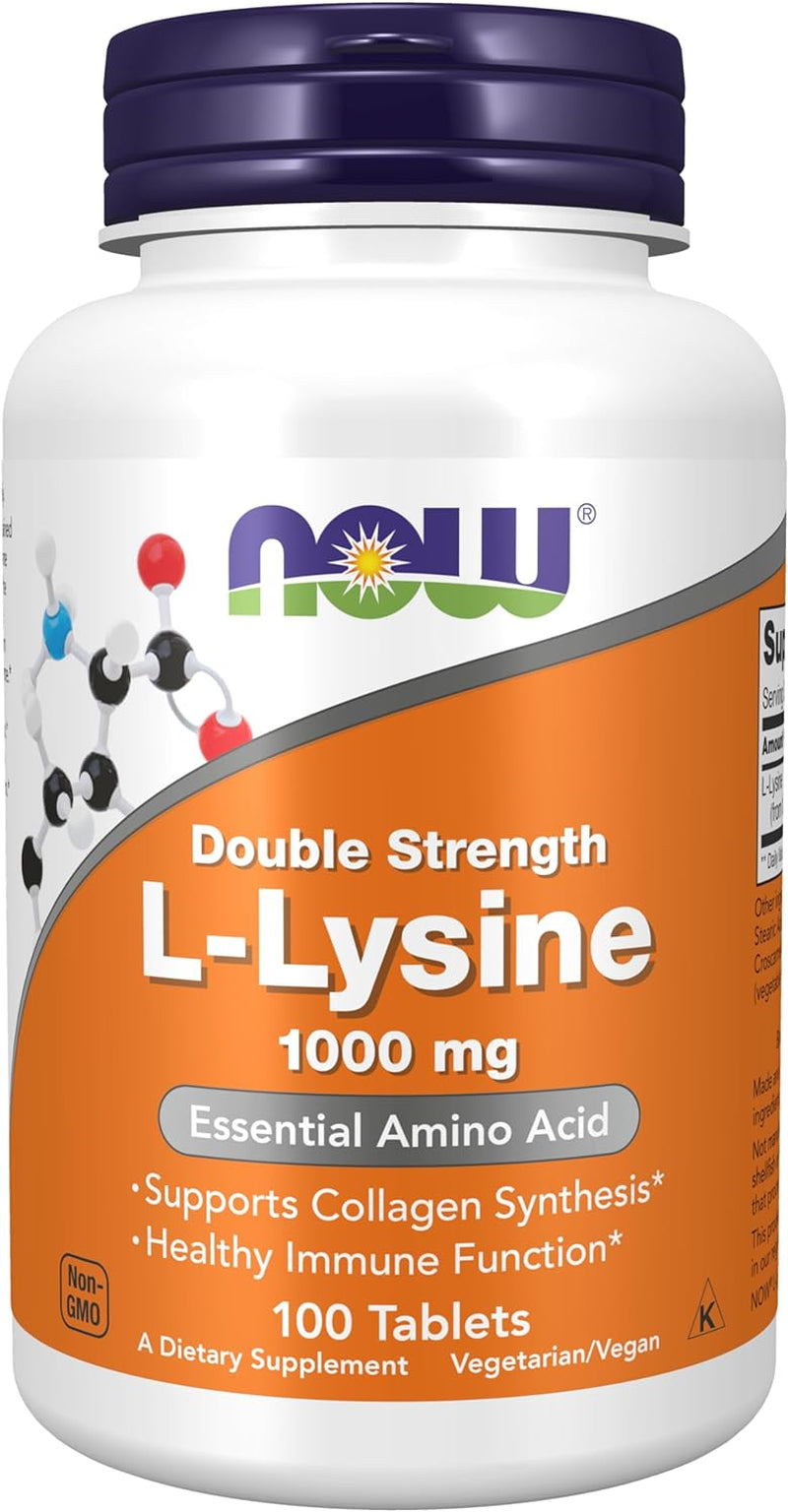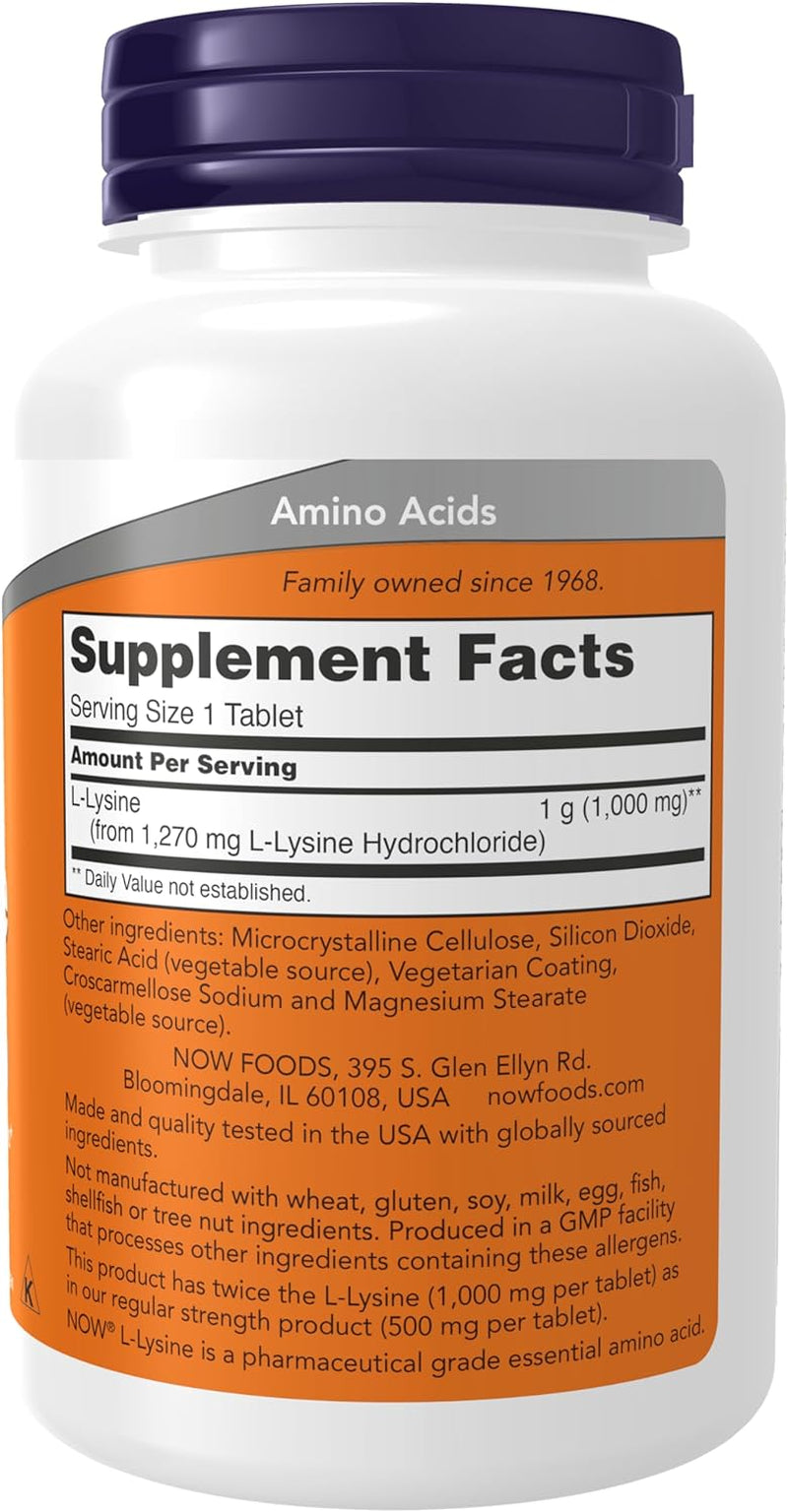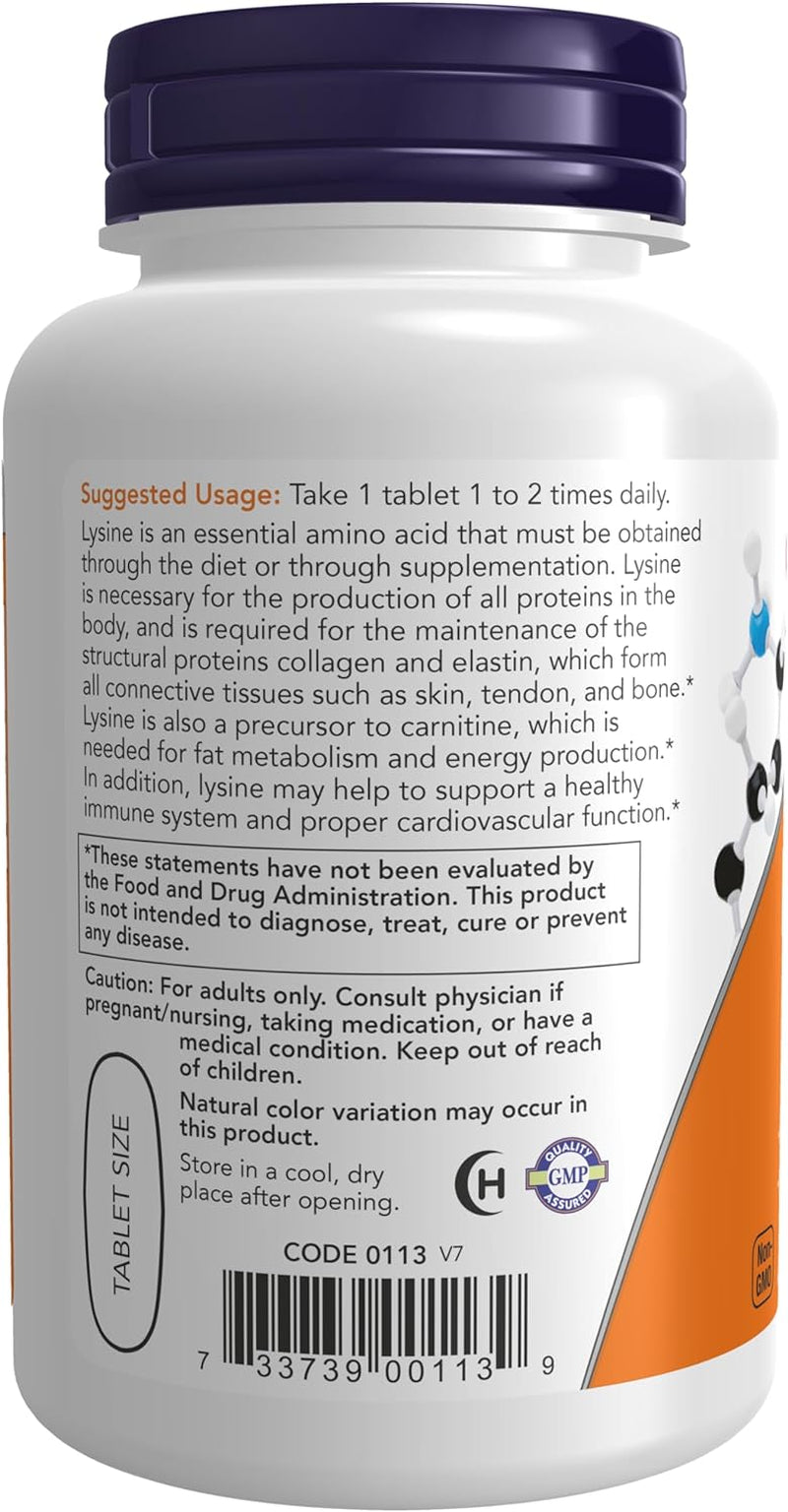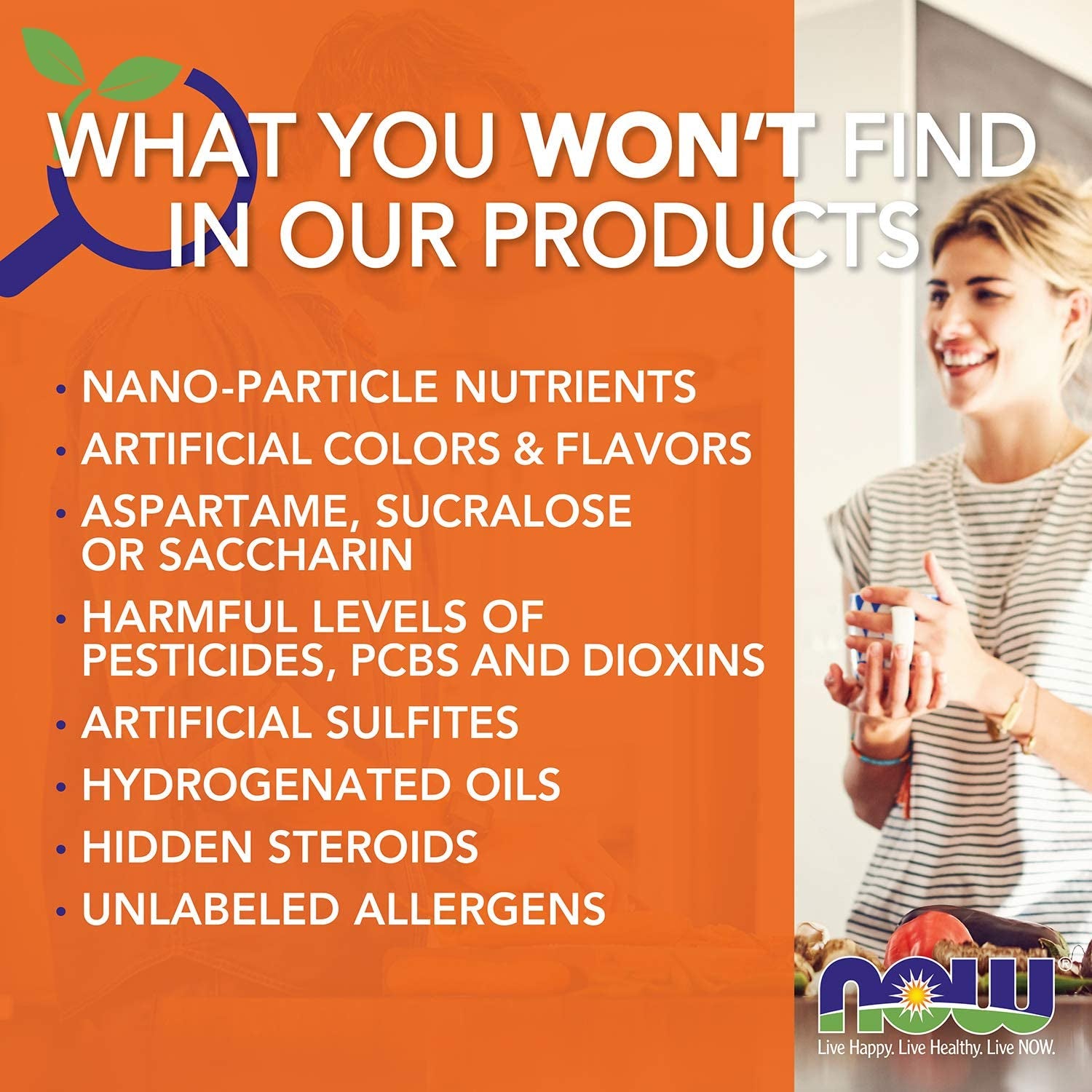





NOW Foods L-Lysine 1,000 mg - Supports Collagen, Vegan, Non-GMO, 100 Tablets


Triticum Vulgare (Wheat) Gluten
Medium RiskTriticum vulgare (wheat) gluten is a protein derived from wheat that functions primarily as a binding agent in various food and cosmetic products. It provides texture and elasticity, making it a common ingredient in baked goods and some personal care items.
Sustai Insights
Wheat gluten offers functional benefits such as enhancing product texture and acting as a stabilizer. However, it poses moderate allergenic risks, particularly for individuals with gluten sensitivity or celiac disease. Environmental concerns are low, with no significant pollutant potential noted. Regulatory bodies do not impose major restrictions, but products must be clearly labeled for consumer safety. Overall, the risk level is assessed as medium. Safe usage practices should be observed, especially for sensitive populations, and alternatives like pea protein or other plant-based binders may be considered.
Cellulose
Low RiskCellulose is a natural polysaccharide derived from plant cell walls, primarily used as a thickening agent, stabilizer, and emulsifier in cosmetic formulations. It is known for its ability to improve texture and consistency in products.
Sustai Insights
Cellulose serves as an effective thickening and stabilizing agent, enhancing product texture while being biodegradable and derived from renewable sources. Health risks are minimal, with low concerns regarding carcinogenicity, allergies, and reproductive toxicity. Environmental impacts are also low, as cellulose does not contribute significantly to pollution or bioaccumulation. Regulatory agencies have not issued restrictions on its use. Overall, cellulose presents a low risk profile, making it a suitable ingredient choice in cosmetics.
Egg
Low RiskEgg is the entire content of chicken eggs, commonly used as an ingredient in various products for its nutritional and functional properties.
Sustai Insights
Eggs are known for their functional benefits, including serving as a binding agent and providing protein. They are typically sustainably sourced and biodegradable. Health risks are considered low, with minimal concerns regarding carcinogenicity, allergies, or reproductive toxicity. Environmental risks are also low, with no significant pollutant potential. Regulatory bodies do not impose current restrictions on egg usage. Overall, the risk level is low, and safe usage practices should be observed, though alternatives like plant-based substitutes may be considered for those with allergies.
Lysine
Low RiskLysine is an essential amino acid that plays a critical role in protein synthesis, hormone production, and calcium absorption. It is involved in the formation of collagen and contributes to immune function. Lysine is not produced by the body and must be obtained through dietary sources or supplements.
Sustai Insights
Lysine contributes positively by aiding in protein synthesis and supporting immune health. It is considered safe, with low risks for carcinogenicity, allergies, and developmental toxicity. Environmental impact is minimal, as it is not a pollutant or bioaccumulative. Regulatory bodies have not imposed significant restrictions, indicating low risk overall. For safe usage, it is important to adhere to recommended dietary allowances. Alternatives include other amino acids like arginine or histidine, though lysine's unique benefits make it irreplaceable in certain contexts. Overall, lysine presents a low risk.
Magnesium Stearate
Low RiskMagnesium stearate is a magnesium salt of stearic acid, commonly used as a lubricant and anti-caking agent in pharmaceuticals and cosmetic products. It helps in the manufacturing process by preventing ingredients from clumping together and ensuring even distribution in formulations.
Sustai Insights
Magnesium stearate is recognized for its functional benefits as a lubricant and anti-caking agent, enhancing product stability. It is considered low risk regarding health concerns, including carcinogenicity and allergenic potential, with no significant environmental hazards reported. Regulatory bodies, including the FDA, have not imposed major restrictions, supporting its safe use in various applications. Recommended usage levels are typically low, maintaining safety in formulations. Overall, the ingredient is assessed as low risk, with no significant adverse health or environmental impacts identified.
Milk
Low RiskMilk is whole milk from cows, primarily used as a source of nutrition and an ingredient in various food products. It contains proteins, fats, carbohydrates, vitamins, and minerals, contributing to its functional benefits in culinary applications.
Sustai Insights
Milk provides essential nutrients and serves as a versatile ingredient in food, enhancing flavor, texture, and nutritional value. It is generally regarded as safe with low concerns for carcinogenicity, allergies, or developmental toxicity. Environmental risks are minimal, and regulatory bodies impose no significant warnings. However, individuals with lactose intolerance or dairy allergies should exercise caution. Overall, milk is assessed as low risk based on current scientific consensus.
Stearic Acid
Low RiskStearic acid is a naturally occurring fatty acid commonly found in animal and vegetable fats. It functions primarily as an emulsifier, thickener, and stabilizer in cosmetic and personal care products, providing texture and consistency.
Sustai Insights
Stearic acid offers functional benefits such as effective emulsification and stabilization of formulations. It is derived from renewable sources and is biodegradable, contributing to its sustainability profile. Health risks are low, with minimal concerns regarding carcinogenicity, allergies, or reproductive toxicity. Environmental risks are also low, with no significant pollutants or bioaccumulation concerns noted. Regulatory bodies, including the FDA, do not impose restrictions on its use. Overall, stearic acid is assessed as low risk, and its safe usage practices are well-established, with no significant alternatives needed.
Lysine Hydrochloride
Low RiskLysine hydrochloride is an amine salt derived from lysine, an essential amino acid. It is commonly used in dietary supplements and pharmaceutical formulations to support protein synthesis, immune function, and overall health.
Sustai Insights
Lysine hydrochloride offers functional benefits such as supporting muscle repair and immune system health. It is recognized for its low toxicity and is not associated with significant health risks, including carcinogenicity or allergens. Regulatory bodies indicate minimal restrictions, affirming its safety for use. However, environmental impacts are not extensively documented, and while there are no major concerns, it is advisable to monitor dosage. Overall, this ingredient is assessed as low risk, with no prominent alternatives required.
Cellulose
Low RiskCellulose is a natural polysaccharide derived from plant cell walls, primarily used as a thickening agent, stabilizer, and emulsifier in cosmetic formulations. It is known for its ability to improve texture and consistency in products.
Sustai Insights
Cellulose serves as an effective thickening and stabilizing agent, enhancing product texture while being biodegradable and derived from renewable sources. Health risks are minimal, with low concerns regarding carcinogenicity, allergies, and reproductive toxicity. Environmental impacts are also low, as cellulose does not contribute significantly to pollution or bioaccumulation. Regulatory agencies have not issued restrictions on its use. Overall, cellulose presents a low risk profile, making it a suitable ingredient choice in cosmetics.
Egg
Low RiskEgg is the entire content of chicken eggs, commonly used as an ingredient in various products for its nutritional and functional properties.
Sustai Insights
Eggs are known for their functional benefits, including serving as a binding agent and providing protein. They are typically sustainably sourced and biodegradable. Health risks are considered low, with minimal concerns regarding carcinogenicity, allergies, or reproductive toxicity. Environmental risks are also low, with no significant pollutant potential. Regulatory bodies do not impose current restrictions on egg usage. Overall, the risk level is low, and safe usage practices should be observed, though alternatives like plant-based substitutes may be considered for those with allergies.
Lysine
Low RiskLysine is an essential amino acid that plays a critical role in protein synthesis, hormone production, and calcium absorption. It is involved in the formation of collagen and contributes to immune function. Lysine is not produced by the body and must be obtained through dietary sources or supplements.
Sustai Insights
Lysine contributes positively by aiding in protein synthesis and supporting immune health. It is considered safe, with low risks for carcinogenicity, allergies, and developmental toxicity. Environmental impact is minimal, as it is not a pollutant or bioaccumulative. Regulatory bodies have not imposed significant restrictions, indicating low risk overall. For safe usage, it is important to adhere to recommended dietary allowances. Alternatives include other amino acids like arginine or histidine, though lysine's unique benefits make it irreplaceable in certain contexts. Overall, lysine presents a low risk.
Magnesium Stearate
Low RiskMagnesium stearate is a magnesium salt of stearic acid, commonly used as a lubricant and anti-caking agent in pharmaceuticals and cosmetic products. It helps in the manufacturing process by preventing ingredients from clumping together and ensuring even distribution in formulations.
Sustai Insights
Magnesium stearate is recognized for its functional benefits as a lubricant and anti-caking agent, enhancing product stability. It is considered low risk regarding health concerns, including carcinogenicity and allergenic potential, with no significant environmental hazards reported. Regulatory bodies, including the FDA, have not imposed major restrictions, supporting its safe use in various applications. Recommended usage levels are typically low, maintaining safety in formulations. Overall, the ingredient is assessed as low risk, with no significant adverse health or environmental impacts identified.
Milk
Low RiskMilk is whole milk from cows, primarily used as a source of nutrition and an ingredient in various food products. It contains proteins, fats, carbohydrates, vitamins, and minerals, contributing to its functional benefits in culinary applications.
Sustai Insights
Milk provides essential nutrients and serves as a versatile ingredient in food, enhancing flavor, texture, and nutritional value. It is generally regarded as safe with low concerns for carcinogenicity, allergies, or developmental toxicity. Environmental risks are minimal, and regulatory bodies impose no significant warnings. However, individuals with lactose intolerance or dairy allergies should exercise caution. Overall, milk is assessed as low risk based on current scientific consensus.
Stearic Acid
Low RiskStearic acid is a naturally occurring fatty acid commonly found in animal and vegetable fats. It functions primarily as an emulsifier, thickener, and stabilizer in cosmetic and personal care products, providing texture and consistency.
Sustai Insights
Stearic acid offers functional benefits such as effective emulsification and stabilization of formulations. It is derived from renewable sources and is biodegradable, contributing to its sustainability profile. Health risks are low, with minimal concerns regarding carcinogenicity, allergies, or reproductive toxicity. Environmental risks are also low, with no significant pollutants or bioaccumulation concerns noted. Regulatory bodies, including the FDA, do not impose restrictions on its use. Overall, stearic acid is assessed as low risk, and its safe usage practices are well-established, with no significant alternatives needed.
Lysine Hydrochloride
Low RiskLysine hydrochloride is an amine salt derived from lysine, an essential amino acid. It is commonly used in dietary supplements and pharmaceutical formulations to support protein synthesis, immune function, and overall health.
Sustai Insights
Lysine hydrochloride offers functional benefits such as supporting muscle repair and immune system health. It is recognized for its low toxicity and is not associated with significant health risks, including carcinogenicity or allergens. Regulatory bodies indicate minimal restrictions, affirming its safety for use. However, environmental impacts are not extensively documented, and while there are no major concerns, it is advisable to monitor dosage. Overall, this ingredient is assessed as low risk, with no prominent alternatives required.
Triticum Vulgare (Wheat) Gluten
Medium RiskTriticum vulgare (wheat) gluten is a protein derived from wheat that functions primarily as a binding agent in various food and cosmetic products. It provides texture and elasticity, making it a common ingredient in baked goods and some personal care items.
Sustai Insights
Wheat gluten offers functional benefits such as enhancing product texture and acting as a stabilizer. However, it poses moderate allergenic risks, particularly for individuals with gluten sensitivity or celiac disease. Environmental concerns are low, with no significant pollutant potential noted. Regulatory bodies do not impose major restrictions, but products must be clearly labeled for consumer safety. Overall, the risk level is assessed as medium. Safe usage practices should be observed, especially for sensitive populations, and alternatives like pea protein or other plant-based binders may be considered.
Experience the powerful benefits of NOW Foods L-Lysine Hydrochloride, a double-strength essential amino acid supplement designed for health-conscious consumers. This vegan-friendly formula supports collagen synthesis, essential for maintaining structural proteins in the body, ensuring healthy skin and joints.
- Enhanced Strength: Each tablet delivers 1,000 mg of L-Lysine, providing twice the potency compared to regular strength options, making it an effective choice for daily supplementation.
- Health Support: Known for its role in protein production, L-Lysine aids in collagen and elastin maintenance, which are vital for skin elasticity and overall wellness.
- Clean Ingredients: Non-GMO, gluten-free, soy-free, and nut-free, these tablets cater to various dietary needs while being made without common allergens.
- Quality Assurance: Manufactured in a GMP-certified facility, ensuring high standards for stability and potency, reflecting the commitment to quality and safety.
- Family-Owned Commitment: Proudly packaged in the USA by a family-owned business since 1968, supporting ethical practices and community impact.
Choose NOW Foods L-Lysine for a sustainable and health-conscious addition to your wellness routine.
Subscribe & Save with Sustai
- Best Price Guarantee: Always enjoy the lowest prices on sustainable home essentials.
- No Surprises: We’ll notify you before shipping. No hidden fees, ever.
- You’re in Charge: Change, pause, or cancel your subscription anytime with ease.
- Eco-Friendly Deliveries: Our grouped shipments mean less packaging and lower emissions.
Join us on a sustainable journey. Special offers for a limited time! Prices and promotions may change.
Recommended Products
Experience the powerful benefits of NOW Foods L-Lysine Hydrochloride, a double-strength essential amino acid supplement designed for health-conscious consumers. This vegan-friendly formula supports collagen synthesis, essential for maintaining structural proteins in the body, ensuring healthy skin and joints.
- Enhanced Strength: Each tablet delivers 1,000 mg of L-Lysine, providing twice the potency compared to regular strength options, making it an effective choice for daily supplementation.
- Health Support: Known for its role in protein production, L-Lysine aids in collagen and elastin maintenance, which are vital for skin elasticity and overall wellness.
- Clean Ingredients: Non-GMO, gluten-free, soy-free, and nut-free, these tablets cater to various dietary needs while being made without common allergens.
- Quality Assurance: Manufactured in a GMP-certified facility, ensuring high standards for stability and potency, reflecting the commitment to quality and safety.
- Family-Owned Commitment: Proudly packaged in the USA by a family-owned business since 1968, supporting ethical practices and community impact.
Choose NOW Foods L-Lysine for a sustainable and health-conscious addition to your wellness routine.

You can have at most 2 Sustainable Steals products in your cart
Customer Reviews
Customers’ View
Customers generally appreciate the effectiveness of NOW's L-Lysine supplements, particularly for immune support and skin health. Many users report positive experiences in reducing cold sore outbreaks, with one customer mentioning fewer and less severe occurrences since starting the supplement. The vegan-friendly formulation and adherence to GMP standards resonate well with health-conscious consumers, emphasizing safety and quality. While some users note the large size of the tablets as a minor inconvenience, they also highlight the lack of unpleasant taste, making it more manageable. Overall, customers find this product beneficial for their health needs and aligned with their commitment to quality and wellness.
AI-generated from the text of customer reviewsThis product is rated 4.8 of 5.0 stars.
It has received 5 reviews.





